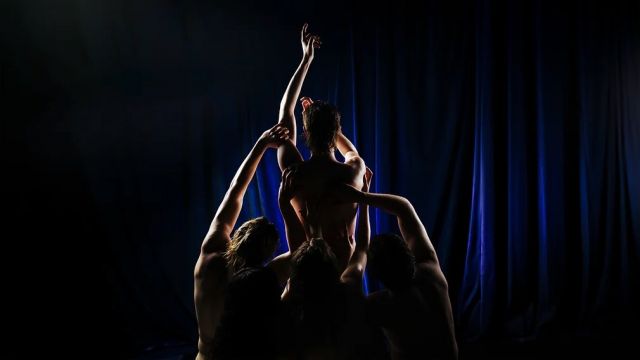Dredge
Dredge tells its allegorical story almost entirely through dance, expressive, metaphoric movement and imagery. Eight performers – varied, individual beings of all shapes and sizes – travel from innocence and wonder to restriction, conformity and rage, to rebirth and hope. They live at first in joy and spontaneity – and yet in awe and maybe fear of some mighty but unseen force. Their unity may take surprising and disturbing forms. At one point, they form what looks like a human caterpillar…
Their costumes - with what appear to be networks of veins covering their bodies - suggest the essential fragility of vulnerable human beings. At the centre of the playing space, a tiered platform contains a well and its water (real water) is as transformative as so much else here: it is a source of life and wonder, but also a source of power that is too easily diverted to other ends… At times, our humans gather around the well and somehow resemble the monkeys around the waterhole in Kubrick’s 2001 – uncomprehending and apprehensive, violence not far away.
After a demonstration of our humans’ arcadian innocence, comes a true coup de theatre moment: black trousers are dropped from the flies. Our humans obediently put them on. A first restriction, a first submission to conformity that also hides and denies half their bodies… Innocence drops away. Aggression, destructive and self-destructive actions hold sway.
Redemption will follow rebellion and be not so much earned as discovered.
Here is a truly collaborative production. Apart from director Brandon Armstrong – who has moulded his cast into a tightly disciplined yet individually expressive unit – and composer and sound designer Jack Burmeister – who here supplies once more a highly evocative score – and lighting designer Tom Vulcan - all the other ‘creatives’ are the performers.
Burmeister has worked from a sound concept is by performer Hyacinth Makka. The set concept is by Maggie Filor and Luke Slade – both performers. Performer Jessica Pascoe’s choreography is at the heart of Dredge – its central means of expression. The associate producer and dramaturg is performer Rosa Ablett-Johnstone.
There is, in the second half, some very brief spoken text – which the program says is ‘verbatim’ and so, I guess, expressive of our modern world – but the words are unfortunately lost under the music and poor delivery. That would be the only element worth reconsidering.
But all these voices, ideas and clearly talented performers joined together could have been a recipe for chaos and disaster. (Of which we have seen some well-intentioned but flawed examples recently.) Not so here. Dredge is focussed, coherent, sometimes funny, sometimes tragic, and comprehensible all the way through. Burmeister’s score is outstanding, so beautifully in sync with Pascoe’s choreography and mime. And Armstrong ensures that the show never loses its grip on the audience’s engagement and imagination - because nothing is ‘explained’. The audience is required to feel and interpret the movements, the groupings, the sudden maverick outbreaks, the shifts of facial expression and body language. And we do. Dredge is an impressive achievement, and I do hope people will go and experience its invention and imagination.
Michael Brindley
Subscribe to our E-Newsletter, buy our latest print edition or find a Performing Arts book at Book Nook.

